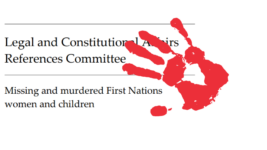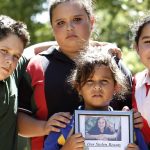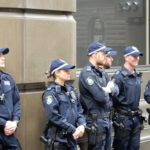Silence Remains on Hidden Settler Colonial Crisis of Disappeared First Nations Women

The Missing and Murdered First Nations Women and Children inquiry delivered its final report last Thursday, and as particular experts on disappeared First Nations women had warned on 15 May, the inquiry missed the mark by a wide berth as it avoided naming the culprit behind this hidden crisis.
The situation of disappeared and murdered First Nations women, girls and gender diverse people in Canada has been documented and reported on for decades, so when it’s raised one does not think of a crisis involving First Nations men committing acts of domestic violence against women.
Indeed, the local Senate report quoted early on from the 2019 final report of the Canadian inquiry, which found that the Canadian settler colonial state’s deliberate and ongoing project of “colonialism, discrimination and genocide explains the high rates of violence against” these women and girls.
However, after citing the Canadian finding, the local inquiry report spends page upon page discussing domestic and family violence issues, without addressing a system that has dehumanised First Nations women to the point that they’re easy prey for aggressive men, especially white male strangers.
And by the end of chapter three, as numerous government funding figures for domestic violence are cited, the best option appeared to be to flick through to the end of the report where Senator Lidia Thorpe had included additional comments on “Indigenous Femicide in so-called Australia”.
Indigenous femicide
“I would like to begin by acknowledging that ‘Aboriginal women don’t just go missing, someone makes them disappear’,” Senator Thorpe made clear. “Indeed, ‘what is missing are the white male perpetrators of this violence, whether they be strangers on the street or agents of the state’.”
“The racial and gendered violence that is perpetrated against our women and girls today is the same systemic and colonial violence perpetrated as it has been since the first invasion and the Frontier Wars,” she continues, “‘like other forms of colonial violence, it has been rendered invisible’.”
As cited in the Senate report, Indigenous women are more likely to go missing and less likely to be found. Twenty percent of currently missing women are Aboriginal women, yet First Nations people represent around 3 percent of the continent’s entire population.
The Gunnai Gunditjmara and Djab Wurrung senator further points out that while the Senate inquiry, of which she was not a member, borrowed terms from the “community-led” Canadian inquiry, it didn’t mention “Indigenous femicide”, which it recognised as a form of “racial and colonial genocide”.
And not only did the inquiry render Indigenous femicide invisible, as well as the white individual perpetrators, but it failed to recognise that law enforcement agencies, the courts and the entire criminal justice system are in cahoots with the whole downplaying of the situation.
“A supposed landmark inquiry”
Renowned journalist Dr Amy McQuire said on social media following the 15 August report release, that she’s distressed and angry that the “gravity of this situation, what we are facing in this country around the crisis of forcibly disappeared Aboriginal women and girls”, continues to remain invisible.
The Darumbal and South Sea Islander writer added that even as she addressed the inquiry, she got the sense that the politicians didn’t even believe there was such a crisis, and again, in reading much of the report there is no mention of the setter colonial state in the room.
“That fear that they could not recognise the enormity of the crisis that is affecting Black women, in which Black women are being targeted for violence and the coronial process is really covering it up, alibiing, letting perpetrators off, letting the state off, letting the police off, is really horrific,” she said.
McQuire was coauthor of a December 2022 submission to the Senate inquiry, which was further attributed to Sisters Inside and the Institute for Collaborative Race Research (ICRR). And it pointed to issues with the inquiry’s terms of reference, that again didn’t mention the crisis.
As ICCR director Dr Chelsea Watego put it to the inquiry, “grieving families are not asking you to keep better count of our dead, or seeking commemorations and condolences for our losses, as the terms of reference seem to imply”.
“These families want justice for racial and gendered violence against Indigenous women,” the Munanjahli and South Sea Islander author of Another Day in the Colony stressed. “These families want accountability and safety for our communities now.”
Yet, the first recommendation of the inquiry is “governments codesign with First Nations families and communities… a culturally appropriate and nationally significant way in which to recognise and remember the First Nations women and children who have been murdered or disappeared”.
And as Thorpe noted, the inquiry did make some good recommendations, in terms of Aboriginal women and children experiencing domestic violence, but it then relies on law enforcement agencies and the mainstream media to act differently in terms of addressing a crisis it fails to recognise.
Sealing the silence on the issue
Australia was founded on genocide and the dehumanisation of First Nations people. This involved mass killings and the stealing and depopulating of lands, and under such circumstances, women and girls and gender diverse people are fair game for racist, misogynistic white men to do as they please.
The inquiry found that the data relating to missing persons is inconsistent and only four jurisdictions noted Indigenous status prior to 2021. It then cites the figures for that year, and even with SA withholding its data, 936 First Nations women and 5,531 First Nations children were reported missing.
And Thorpe and those who produced the submission mentioned above and testified at the inquiry stress this is not simply a domestic and family violence issue.
Rather, as the Canadian inquiry concluded, this is an aspect of settler colonialism termed Indigenous femicide, which devalues First Nations women and girls leaving them open to assault and attack without adequate repercussions from a system founded upon the perpetration of such violence.
“Over 17 years as a lawyer representing families in coronial inquests for disappeared and murdered Aboriginal and Torres Strait Islander women in so-called Australia, this has been a tragic and persistent crisis,” Sisters Inside chief executive Deb Kilroy told the 15 May inquiry hearing.
“It’s a crisis where, aside from the families and their communities, no-one has been willing to pay any attention to”, the “white colonial settler” lawyer added.
Greens Senator Dorinda Cox, who moved the motion to see the inquiry established, told the ABC that the final report did not go far enough in its recommendations, especially in terms of collecting data on these First Nations women and children, who are “essentially disappeared”.
The Noongar Bibbulmen Yamajti politician outlined that the lack of concise data being collected on missing First Nations women and children is resulting in the crisis either being ignored outright or figures that don’t reveal its extent. Yet, the recommendations failed to address this issue as well.
“I am incredibly distressed at how the silencing continues,” Dr McQuire added on social media. “I just want people to know this is really horrific.”
“This is a message that’s sent to every Aboriginal woman that literally this country doesn’t care,” stressed the author of the recently released Black Witness.







